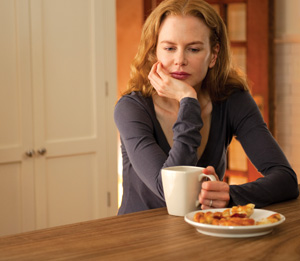

THE TITLE of Rabbit Hole is banal, but John Cameron Mitchell’s Douglas Sirk–like approach emulates studio-era work. Mitchell seems to have kicked the story uptown; written about Queens, it now takes place in waterfront property in Yonkers. Eight people are credited as buyers to dress the sets, and it’s clear the main character has climbed out of the working class. As always, Nicole Kidman risks being box-office poison through displaying unmanaged anger. Eight months after the death of her young son, her Becca is standing at a crossroads. Her choice is to start healing or to never get over it and shut everyone out of her personal realm of grief.
Rabbit Hole‘s roots in David Lindsay-Abaire’s play are all visible. Becca is a diva part, a woman who gets to be like a Jacob’s ladder in a mad scientist’s lair, arcing up static and sparks. Maybe it’s just that I’m a man, but I was more taken with the story of her husband, Howie (Aaron Eckhart), with his edge of foxy subversiveness even in duty, as well as his ability to get into the meat of his feelings. He does the right things, religiously showing up for grief therapy every week. The film’s spots of humor are the clichés one hears at such groups. There’s a benefit for Howie at the sessions, too: a pretty, playful, hemp-smoking fellow mourner (Sandra Oh).
The camera focuses on pieces of graphic art by Dash Shaw. These turn out to be excerpts from the artwork of another figure in the tragedy: Jason (Miles Teller), the young man who was driving the day Becca’s child died. Becca befriends him; it’s easier for her than bonding with her sister (Tammy Blanchard), who drinks and brawls, or her Queens dingbat mother (Dianne Wiest), who, true to the stagey origins, has the wisest speech, all about grief being heavy and humble as a brick.
Mitchell (Hedwig and the Angry Inch) is an interesting director, and one wishes he would work more often. Rabbit Hole’s aim is not to jerk tears but to envelop a viewer in a tragedy, and it succeeds. The dramatic crescendo is broken up into cubist angles and slow-motion horror, abstracting a mother’s unthinkable loss, faceting it like a jewel.
PG-13; 91 min.



